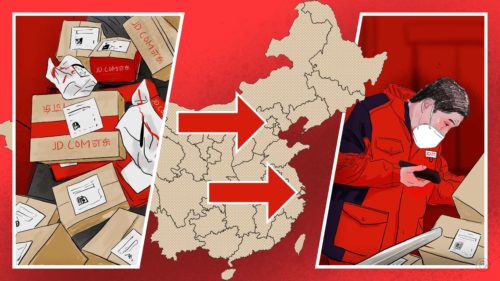‘Can lives be saved by attacking China?’ Beijing scolds Washington as Trump casts blame for ‘Plague’

U.S.-China relations continue to plunge since the Trump administration — in particular Mike Pompeo, the top diplomat at the Department of State — began claiming it had “enormous evidence” for the conspiracy theory that the coronavirus originated in a lab in Wuhan. American allies don’t find the theory credible, and Beijing has reacted by reviving conspiracy theories of its own.
Today, other parts of the Trump administration claimed that they have identified the “targeting and compromise of U.S. organizations conducting COVID-19-related research by P.R.C.-affiliated cyber actors and non-traditional collectors.” This warning came from the Federal Bureau of Investigation (FBI) and the Cybersecurity and Infrastructure Security Agency (CISA).
Also today, Trump began calling COVID-19 “the Plague from China,” in a tweet that compared the losses from the virus to the prospective gains of “100 Trade Deals.” Trump’s minimization of his trade deal could be the latest indication that he is considering walking away, after twice threatening to do so last week. The South China Morning Post reports that hawks in Beijing, too, are ramping up criticism of the trade deal.
Chinese state media hasn’t responded to the “Plague” comment yet, but it has to the allegation of stealing COVID-19 research, as it was first reported on Sunday in the New York Times. The People’s Daily reposted this article from the Global Times: China leads vaccine R&D, no need to steal.
The People’s Daily is now running an ongoing daily series of articles called “Questions to American politicians,” which are aggressive, to say the least. The first seven questions are:
- Do elderly people have the right to life?
- Is this what you call ‘human rights’?
- Can lives be saved by attacking China?
- Why not fix your sick and twisted mind first?
- Aren’t you afraid that passing the buck to China will backfire?
- Aren’t you aware of what you have done?
- Aren’t you ashamed to be the virus’ accomplice?
This coincides with the publication of an extremely lengthy rebuttal of 24 “outrageous lies” from American politicians and media that the foreign ministry posted on May 9 (in Chinese). For more, see Reuters: China refutes 24 ‘lies’ by U.S. politicians over coronavirus.
Other recent indications of transpacific animosity:
Washington Post columnist Josh Rogin, whose writing usually represents the D.C. “tough on China” consensus, today went even tougher and called for the U.S. to “take off the gloves against Chinese cybercrime.” Rogin is calling for U.S. Treasury Department sanctions on a variety of Chinese actors, in response to the allegations by the FBI that China is trying to steal biomedical research on COVID-19.
Joe Biden’s campaign may try to out-tough Trump on China, as it is “preparing to roll out policies on how his future administration would better deal with China and will continue to show how Trump is weak on America’s top geopolitical and economic competitor,” Reuters reports.
Student leaders from the College Democrats of America representing 16 states joined student leaders from the College Republican National Committee representing 45 states in an open letter to Washington. The letter is organized by a new nonprofit called the Athenai Institute, which has the goal of “removing the influence of the Chinese Communist Party one university at a time,” including calling for the immediate closure of all Confucius Institutes and dissolution of all Chinese Students and Scholars Associations.
Fears of a “financial war” between the U.S. and China were high at the end of last year, and are being revived again now after the Trump administration “asked the board that runs the retirement savings program for federal employees and military personnel to not allow funds to be invested in Chinese businesses,” as the Washington Post reported yesterday.
It is now “quite a credible risk” that financial restrictions could “extend beyond certain federal investment funds to the broader investment community,” according to Thomas Fang, head of China global markets at UBS, per the Financial Times (paywall).






